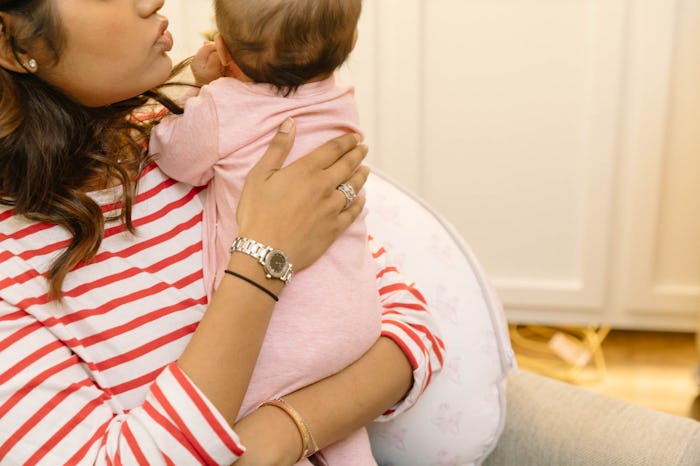Life
If Your Baby Needs A Good Burp, Here's How They'll Let You Know
Interpreting the many sounds and symptoms of a baby can feel a bit like a guessing game, especially when you are trying to do so while operating on too little sleep and not enough coffee. Because, really is there ever enough? If your little one starts to rub their eyes, then you need to head to bed. If they are grabbing at their ears, then it could be teething or an ear infection. But some signals aren't as cut and dry, like burping. But it turns out there are some signs your baby needs to burp more often, so I'm going to go ahead and help a tired parent out.
Texas-based Dr. Eboni Hollier, who is board-certified in both general and developmental and behavioral pediatrics, tells Romper in an email interview that the signs your baby needs to burp include your baby squirming around a lot or appearing uncomfortable. "Babies are generally happy when eating and immediately afterwards," she says. "If your baby is not, consider briefly stopping the feeding to burp your baby."
Hollier explains the reason for burping stems from the fact that when babies eat, whether they are breast or bottle fed, they swallow air. "When too much air is swallowed, this can cause your baby's tummy to feel uncomfortable."
According to Baby Center, if your baby stops sucking on their bottle or resists breastfeeding, then they may also be trying to tell you that they need a good burp. "She may squirm and grimace, particularly if you try to lay her down after a feed," the website noted.
A good rule of thumb for burping is to try giving your baby a pat on the back every 2 to 3 ounces (60 to 90 milliliters) if you bottle-feed or each time you switch breasts if you breastfeed, KidsHealth noted. "If your baby tends to be gassy, spits a lot, has gastroesophageal reflux disease (GERD), or seems fussy during feeding, try burping your baby every ounce during bottle-feeding or every 5 minutes during breastfeeding," the website said. If your baby doesn't burp, then changing positions while burping can also be helpful.
But not all babies have the same burping needs. In fact, BabyCenter suggested that while some babies have a lot of gas and need to be burped after every feeding, others barely ever need it.
Hollier says looking for natural pauses while your baby is feeding is helpful in determining whether or not they need to be burped. "Your baby may take a break on her own during the feeding," she says. "If this happens, consider burping your baby to see if that helps."
Common burping positions include the over-the-shoulder move which, according to Babble, "requires you to hold your newborn firmly against your shoulder and apply a patting or rubbing motion with your hand on your little one’s back," the website noted.
Some parents also favor the face down, on your lap position which is where you place your newborn on your lap with their head resting on one leg and their stomach over your other leg, according to Babble. Other parents prefer to have their baby to sit up while supporting the chest and head with one hand and patting their little one's back with the other hand.
And don't stress if your baby doesn't burp. In fact, if your little one hasn't burped after four minutes, then they may not need to, according to Parenting.
Most importantly, Hollier says, don't forget to trust your mommy instincts. "If you feel your baby may need to burp, go for it — your baby will be glad you did!"
Check out Romper's new video series, Bearing The Motherload, where disagreeing parents from different sides of an issue sit down with a mediator and talk about how to support (and not judge) each other’s parenting perspectives. New episodes air Mondays on Facebook.
